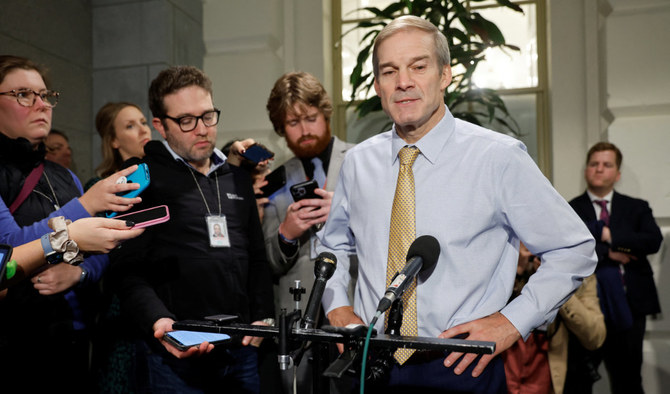WASHINGTON: Republicans abruptly dropped Rep. Jim Jordan on Friday as their nominee for House speaker, making the decision during a closed-door session after the hard-edged ally of Donald Trump failed badly on a third ballot for the gavel.
The outcome left Republicans dejected, frustrated and sinking deeper into turmoil, another week without a House speaker bordering on a full-blown crisis. House Republicans have no realistic or working plan to unite the fractured GOP majority, elect a new speaker and return to the work of Congress that has been languishing since hard-liners ousted Kevin McCarthy at the start of the month.
Afterward, Jordan said simply of his colleagues, “We put the question to them, they made a different decision.”
The hard-charging Judiciary Committee chairman said House Republicans now need to come together and “figure out who our speaker is going to be.”
Their majority control floundering, Republicans left the private session blaming one another for the divisions they have created. Next steps were highly uncertain, as a wide range of Republican lawmakers started pitching themselves for speaker.
But it appears no one at present can win a GOP majority, leaving the House without a speaker and unable to function for the foreseeable future, an embarrassing blow to a central US seat of government.
“We’re in a very bad place right now,” McCarthy said.
Majority Leader Steve Scalize said they would “start over” on Monday. New nominees are to come forward for a candidate forum and internal party votes.
Exasperated with no easy solutions in sight, Rep. Mark Alford, a freshman from Missouri, was far from alone in expressing his anger and disappointment.
“I gave up my career to come here to do something for America, to rebuild our military, to get spending under control, to secure our border — and here we are in this quicksand,” he said.
In a floor vote Friday morning, Jordan’s third reach for the gavel, he lost 25 Republican colleagues, worse than he had fared earlier in the week, and far from the majority needed.
A founder of the far-right House Freedom Caucus, Jordan’s run essentially collapsed in large part because more centrist Republicans are revolting over the nominee they view as too extreme and the hardball tactics being used to win their votes. They have been bombarded with harassing phone calls and even reported death threats.
To win over GOP colleagues, Jordan had relied on backing from Trump, the party’s front-runner in the 2024 election, and groups pressuring rank-and-file lawmakers for the vote. But they were not enough and in fact backfired on some.
Friday’s vote was 194 for Jordan, his lowest tally yet, and 210 for Jeffries, with two absences on each side.
In fact, the Jordan lost rather than gained votes despite hours spent trying to win over holdouts, no improvement from the 20 and then 22 Republicans he lost in early rounds this week.
McCarthy himself rose in the chamber to nominate Jordan, portraying him as a skilled legislator who reaches for compromise. That drew scoffs of laughter from the Democratic side of the aisle.
Democrats nominated Leader Hakeem Jeffries, with Rep. Katherine Clark calling Jordan, who refused to certify the 2020 presidential election results, “a threat to democracy.”
For more than two weeks the stalemate has shut down the US House, leaving a major part of the government severely hobbled at a time of challenges at home and abroad. While Democrats have offered to broker a bipartisan deal to re-open the House, the Republican majority appears to have no idea how to end the political turmoil and get back to work.
With Republicans in majority control of the House, 221-212, any candidate can lose only a few detractors. It appears there is no Republican at present who can win a clear majority, 217 votes, to become speaker.
One extraordinary idea, to give the interim speaker pro tempore, Rep. Patrick McHenry, more powers for the next several months to at least bring the House back into session and conduct crucial business, was swiftly rejected by Jordan’s own ultra-conservative allies and brushed back by McHenry himself.
Republicans predict the House could essentially stay closed until the mid-November deadline for Congress to approve funding or risk a federal government shutdown.
“We’re trying to figure out if there’s a way we can get back with a Republican-only solution,” said veteran legislator Rep. Tom Cole, R-Oklahoma
“That’s what normal majorities do. What this majority has done is prove it’s not a normal majority.”
What’s potentially more unsettling is that it’s not at all clear what the House Republicans are even fighting over any more — let alone if any GOP leader can fix it.
The Republican chaos that erupted Oct. 3 when a small band of eight hard-liners led by Rep. Matt Gaetz of Florida orchestrated McCarthy’s historic ouster, has cascaded into angry grievances, new factions and untested alliances.
Gaetz and the hard-liners wanted to punish McCarthy for a number of perceived wrongs, including passing legislation with Democrats to keep the government funded and prevent a federal shutdown.
But when Majority Leader Steve Scalize won the nomination to replace McCarthy, Jordan’s allies broke from party rules and blocked the Louisianan’s rise. Scalize abruptly withdrew his nomination.
Angry that Scalize didn’t seem to get fair treatment, more mainstream Republicans staged their own revolt against hard-liner Jordan, saying he didn’t deserve the gavel.
Weeks of heated, fiery meetings later, Republicans have drifted far off track from what had been their House majority’s stated priorities of cutting spending and other goals.
Democratic Leader Jeffries reiterated that his party was “ready, willing and able” to work with more traditional Republicans on a path to re-open the House — particularly as Congress is being asked to consider President Joe Biden’s aid package for Israel, Ukraine and other needs.
Jordan has been a top Trump ally, particularly during the Jan. 6 Capitol attack by the former president’s backers who were trying to overturn the 2020 election he lost to Biden. Days later, Trump awarded Jordan a Medal of Freedom.
First elected in 2006, Jordan has few bills to his name from his time in office. He also faces questions about his past.
Some years ago, Jordan denied allegations from former wrestlers during his time as an assistant wrestling coach at Ohio State University who accused him of knowing about claims they were inappropriately groped by an Ohio State doctor. Jordan has said he was never aware of any abuse.
House Republicans drop Jim Jordan as their nominee for speaker, stumbling back to square one
https://arab.news/52267
House Republicans drop Jim Jordan as their nominee for speaker, stumbling back to square one

- The combative Trump ally lost 25 Republican colleagues on his third attempt for the speakership, worse than in his earlier bid
- Chaos erupted on Oct. 3 when a small band of eight pro-Trump hard-liners orchestrated the removal of Kevin McCarthy as House Speaker
UN launches probe into first international staff killed by unidentified strike in Rafah

- Retired Indian army officer Waibhav Anil Kale was on route to European Hospital when killed
- Kale was working with the UN Department of Safety and Security, his colleague also injured
NEW DELHI: The United Nations has launched an investigation into an unidentified strike on a UN car in Rafah on Monday that killed its first international staff in Gaza since Oct. 7, a spokesperson for the UN Secretary General said.
The staff member, a retired Indian Army officer named Waibhav Anil Kale, was working with the UN Department of Safety and Security and was on route to the European Hospital in Rafah along with a colleague, who was also injured in the attack.
Israel has been moving deeper into Rafah in southern Gaza, where more than a million people had sought shelter, and its forces pounded the enclave’s north on Tuesday in some of the fiercest attacks in months.
Israel’s international allies and aid groups have repeatedly warned against a ground incursion into Rafah, where many Palestinians fled, and Israel says four Hamas battalions are holed up. Israel says it must root out the remaining fighters.
In a statement on Monday after Kale’s death, UN Secretary General Antonio Guterres reiterated an “urgent appeal for an immediate humanitarian ceasefire and for the release of all hostages,” saying the conflict in Gaza was continuing to take a heavy toll “not only on civilians, but also on humanitarian workers.”
Palestinian health authorities say Israel’s ground and air campaign in Gaza since Oct. 7 has killed more than 35,000 people and driven most of the enclave’s 2.3 million people from their homes.
His deputy spokesperson Farhan Haq said on Tuesday the UN has established a fact-finding panel to determine the responsibility for the attack.
“It’s very early in the investigation, and details of the incident are still being verified with the Israeli Defense Force,” he said.
There are 71 international UN staff members in Gaza currently, he said.
In its only comment on the matter yet, India’s mission to the UN confirmed Kale’s identity on Tuesday, saying it was “deeply saddened” by his loss.
Israel, which launched its Gaza operation after an attack on Oct. 7 by Hamas-led gunmen who killed some 1,200 people and took more than 250 hostages, according to its tallies, has ordered civilians to evacuate parts of Rafah.
The main United Nations aid agency in Gaza, UNRWA estimates some 450,000 people have fled the city since May 6. More than a million civilians had sought refuge there.
India’s Modi denies stoking Hindu-Muslim divisions to win election, files nomination

- Modi began campaign by showcasing his economic record, governance and popularity
- Changed tack after the first phase to accuse opposition Congress of being pro-Muslim
NEW DELHI: Indian Prime Minister Narendra Modi defended himself against criticism that he is stoking divisions between Hindus and Muslims to win national elections as he filed his nomination on Tuesday for re-election from one of Hinduism’s holiest cities.
India began voting April 19 in the seven-phase election in which Modi, 73, is seeking to be the second prime minister to win a third straight term since independence leader Jawaharlal Nehru.
Although Modi began his campaign by showcasing his economic record, governance and popularity, he has changed tack after the first phase to accuse the main opposition Congress party of being pro-Muslim.
Analysts say this was likely aimed at firing up the base of his Hindu nationalist Bharatiya Janata Party after a low turnout in the first phase sparked doubts that BJP and its allies could win the landslide that the party sought.
“I believe people of my country will vote for me,” Modi told broadcaster CNN-News18 in Varanasi, his parliamentary constituency in the northern state of Uttar Pradesh.
“The day I start talking about Hindu-Muslim (in politics) will be the day I lose my ability to lead a public life,” Modi said, speaking in Hindi. “I will not do Hindu-Muslim. That is my resolve.”
Modi’s critics often accuse him and BJP of targeting minority Muslims to please their hard-line voters, which he and the party deny.
While Hindus make up about 80 percent of India’s 1.4 billion people, it also has the world’s third-largest Muslim population of about 200 million.
Congress has complained to the Election Commission that Modi made “deeply objectionable” comments about Muslims in an April 21 speech, violating poll rules. The commission has sought a response from the BJP on the complaint.
In that speech, Modi accused Congress of planning to do a wealth concentration survey, seize properties and redistribute them, which Congress has denied.
He said at the time:
“During their (Congress) previous government, they said that Muslims have the first right on the wealth of the nation. That means, who will they redistribute this wealth to? They will give it those who have more children, to infiltrators.”
On Tuesday, Modi said he did not name any community in that speech, even as he continued to focus on the theme.
“I have neither said Hindu or Muslim. I have said you should have as many children as you can support,” Modi said.
Detained Thai monarchy reform activist dies after hunger strike

- Netiporn Sanesangkhom, was a member of the activist group Thaluwang, known for their bold and aggressive campaigns
- She is the first political activist in Thailand to have died after carrying on a partial hunger strike for 110 days
BANGKOK: A young activist in Thailand who went on a hunger strike after being jailed for advocating reform of the country’s monarchy system died Tuesday in a prison hospital, officials said. The death sparked fresh calls for reviewing the judicial process that allows political offenders accused of nonviolent offenses to be held for extended periods in prison ahead of being tried.
Netiporn “Bung” Sanesangkhom, 28, was a member of the activist group Thaluwang, known for their bold and aggressive campaigns demanding reform of the monarchy and abolition of the law that makes it illegal to defame members of the royal family. The group’s name can be loosely translated as “breaking through the palace,” a reference to its open criticism of Thailand’s monarchy.
She appears to be the first political activist in Thailand to have died after carrying on a partial hunger strike for 110 days while she was awaiting trial.
The Thailand branch of the human rights group Amnesty International described Netiporn’s death as “a shocking reminder that Thai authorities are denying activists their right to temporary release on bail and using detention to silence the peaceful expression of dissent.”
“This is a grim day for Thai society, highlighting the severe judicial harassment and the justice system’s failure to recognize basic human rights,” the group said. “Speaking out should not lead to death; it should inspire change.”
The popular opposition Move Forward party, which has also campaigned for reform of the monarchy, issued a statement saying that people should not be jailed for holding political opinions and that persons accused of political offenses should be granted bail.
Foreign diplomats and ambassadors from the US, UK, Canada, the EU and elsewhere offered their condolences after Netiporn’s death. German Ambassador Ernest Reichel wrote on social platform X: “My wish would be that political disagreements are not taken to such bitter and extreme consequences.”
Thailand’s monarchy until recent years was widely considered an untouchable, bedrock element of Thai nationalism. Criticism of the monarchy was taboo, and insulting or defaming key royal family members remains punishable by up to 15 years in prison under a lese majeste law, usually referred to as Article 112 of Thailand’s Criminal Code.
Student-led pro-democracy protests beginning in 2020 openly criticized the monarchy, leading to vigorous prosecutions under the law, which had previously been relatively rarely employed. Critics say the law is often wielded as a tool to quash political dissent.
The protest movement faded due to government harassment and the coronavirus pandemic, but Netiporn was one of more than 270 activists charged with the royal defamation law since the protests in 2020-21.
Netiporn suffered cardiac arrest early Tuesday morning, and medical teams spent several hours trying to resuscitate her. She was pronounced dead just before noon, according to a statement from the Corrections Department.
She had two charges of lese majeste pending against her, both of them involving conducting polls in public spaces in 2022 asking people’s opinion about the royal family, according to the group Thai Lawyers for Human Rights. Her release on bail was revoked in January due to her participation in a political rally last year.
Netiporn started her hunger strike after she was detained in January. The Corrections Department said she began eating and drinking water again after April 4. However, the human rights lawyer group’s latest update on her condition on April 25 said she was still fasting.
Two fellow jailed activists are also carrying out hunger strikes. Both are Thaluwang members who were also charged with lese majeste for agitating for reform of the monarchy, and they started their hunger strikes about a month after Netiporn.
Netiporn’s lawyers had applied for her to be transferred from the Central Corrections Hospital to Thammasat University Hospital but she was never granted a prolonged stay there for treatment, said her lawyer, Kritsadang Nutcharas. The authorities said they would establish the legal cause of death.
“Does it seem like there’s standard treatment in the Thai justice system when we compare what these kids are going through with their political charges and what some prominent adults have gone through?” Kritsadang said. He was making an apparent reference to former Prime Minister Thaksin Shinawatra, who returned from exile last year to serve a prison term in corruption-related cases but never spent a single night in jail on grounds of ill health.
At a candlelight vigil Tuesday night outside Bangkok’s Criminal Court, another activist facing lese majeste charges, Panusaya “Rung” Sitthijirawattanakul, decried the failure of Prime Minister Srettha Thavisin’s government to ease the plight of political prisoners.
“Do you need someone to die first before you think of doing something?” she said. “How many of us have to die before you start listening to us? We are not people to be scared of. We’re just ordinary people who are asking for something. So this is very brutal.”
Thaluwang has held high-profile protests calling not only for reform of the monarchy, but also changes in the justice system and an end to political persecution through the courts. It has also called for rejection of Thailand’s application to join the UN Human Rights Council.
Thailand announced its bid for a seat on the rights council for the 2025-2027 term after the current government took office last year, seeking to show its commitment to protect human rights. Critics charge that the reality of law enforcement in the country strongly contradicts its ambition to be recognized by the international community as a human rights defender.
Human Rights Watch has raised concerns over “the Thai government’s use of arbitrary arrest and pretrial detention to punish critics of the monarchy for their views,” which it says is a violation of their rights under international human rights law.
Filipino activists and fishermen sail in 100-boat flotilla to disputed shoal guarded by China

- Philippine coast guard and navy deploy one patrol ship each to keep watch from a distance on the activists and fishermen
- China effectively seized the Scarborough Shoal, a triangle-shaped atoll with a vast fishing lagoon, in 2012
MANILA: A flotilla of about 100 mostly small fishing boats led by Filipino activists sailed Wednesday to a disputed shoal in the South China Sea, where Beijing’s coast guard and suspected militia ships have used powerful water cannons to ward off what they regard as intruders.
The Philippine coast guard and navy deployed one patrol ship each to keep watch from a distance on the activists and fishermen, who set off on wooden boats with bamboo outriggers to assert Manila’s sovereignty over the Scarborough Shoal. Dozens of journalists joined the three-day voyage.
Activists and volunteers, including a Roman Catholic priest, belonging to a nongovernment coalition called Atin Ito — Tagalog for This is Ours — planned to float small territorial buoys and distribute food packs and fuel to Filipino fishermen near the shoal, organizers said, adding they were prepared for contingencies.
“Our mission is peaceful based on international law and aimed at asserting our sovereign rights,” said Rafaela David, a lead organizer. “We will sail with determination, not provocation, to civilianize the region and safeguard our territorial integrity.”
In December, David’s group with boatloads of fishermen also tried to sail to another disputed shoal but cut short the trip after being tailed by a Chinese ship.
China effectively seized the Scarborough Shoal, a triangle-shaped atoll with a vast fishing lagoon ringed by mostly submerged coral outcrops, by surrounding it with its coast guard ships after a tense 2012 standoff with Philippine government ships.
Angered by China’s action, the Philippine government brought the disputes to international arbitration in 2013 and largely won with a tribunal in The Hague ruling three years later that China’s expansive claims based on historical grounds in the busy seaway were invalid under the 1982 UN Convention on the Law of the Sea.
The ruling declared the Scarborough Shoal a traditional fishing area for Chinese, Filipino and Vietnamese fishermen. In the past, fishermen have anchored in the shoal to avoid huge waves in the high seas in stormy weather.
China refused to participate in the arbitration, rejected the outcome and continues to defy it.
Two weeks ago, Chinese coast guard and suspected militia ships used water cannons on Philippine coast guard and fisheries boats patrolling the Scarborough Shoal, damaging both craft.
The Philippines condemned the Chinese coast guard’s action on the shoal, which lies in the Southeast Asian nation’s internationally recognized exclusive economic zone. The Chinese coast guard said it took a “necessary measure” after the Philippine ships “violated China’s sovereignty.”
The Chinese coast guard has also reinstalled a floating barrier across the entrance to the shoal’s vast fishing lagoon, the Philippine coast guard said. The Philippine coast guard removed a similar barrier in the past to allow Filipinos to fish there.
In addition to the Philippines and China, Vietnam, Malaysia, Brunei and Taiwan have also been involved in the territorial disputes.
Chinese coast guard ships had also ventured into waters close to Vietnam, Malaysia and Indonesia in the past, sparking tensions and protests, but the Southeast Asian nations with considerable economic ties with China have not been as aggressively critical against Beijing’s increasingly assertive actions.
The Philippines has released videos of its territorial faceoffs with China and invited journalists to witness the hostilities in the high seas in a strategy to gain international support, sparking a word war with Beijing.
The increasing frequency of the skirmishes between the Philippines and China has led to minor collisions, injured Filipino navy personnel and damaged supply boats in recent months. It has sparked fears the territorial disputes could degenerate into an armed conflict between China and the United States, a longtime treaty ally of the Philippines.
Indonesia floods kill 58 as rescuers race to find missing

- Rescuers said many of the retrieved bodies were found in or around nearby rivers after locals were swept away by the deluge of volcanic material, mud and rain that tore through neighborhoods
Tanah Datar, Indonesia: Indonesian rescuers raced Wednesday to find dozens of people still unaccounted for after flash floods and cold lava flow that inundated neighborhoods and swept away houses over the weekend left 58 people dead.
Hours of torrential rain on Saturday caused mud and rocks to flow into districts near one of Indonesia’s most active volcanos, sweeping away dozens of houses and damaging roads and mosques.
“Based on the latest data... the number of people who died is 58,” national disaster agency chief Suharyanto said in a statement Wednesday.
He added that 35 people remained missing — up from local rescuers’ figure of 22 on Tuesday — and 33 people were injured.
Rescuers said many of the retrieved bodies were found in or around nearby rivers after locals were swept away by the deluge of volcanic material, mud and rain that tore through neighborhoods.
Cold lava, also known as lahar, is volcanic material such as ash, sand and pebbles carried down a volcano’s slopes by rain.
Heavy equipment was deployed to clear debris from the areas worst hit by flooding, which has affected transport access in six districts, said Suharyanto, who goes by one name.
More than 3,300 people have been forced to evacuate from affected areas.
To aid the rescue effort, authorities on Wednesday deployed weather modification technology, the term Indonesian officials use for cloud seeding.
In this case, it is being used in a bid to make clouds rain earlier so the rainfall’s intensity is weakened by the time it reaches the disaster-struck area.
Indonesia is prone to landslides and floods during the rainy season.
In 2022, about 24,000 people were evacuated and two children were killed in floods on Sumatra island, with environmental campaigners blaming deforestation caused by logging for worsening the disaster.
Trees act as a natural defense against floods, slowing the rate at which water runs down hills and into rivers.



















